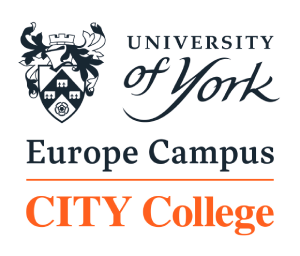News
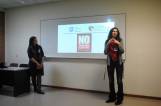
Ms. Kosior and Ms. Sarantidou, from the English Studies Dept., in the 24th International TESOL Macedonia-Thrace Conference
Ms Margarita Kosior, a Lecturer of the English Studies Department, and Ms. Despina Sarantidou, a third-year BA student at the Department, participated in the 24th Annual International TESOL Macedonia-Thrace, Northern Greece Conference, where on 12 February 2017 they delivered a presentation titled “Designing Teaching Materials to Confront Modern-Day Slavery.” Photo credit: Dimitris Tzouris The purpose of the session was to empower other educators to produce teaching materials on issues they feel passionate about and to make them believe that through their own materials and their own work they can really change the world. To this end, in cooperation with The NO Project, Margarita Kosior and Despina Sarantidou presented a project assigned and completed within the scope of the Evaluation and Design of Teaching Materials unit. The NO Project is an award-winning, global, anti-slavery educational campaign which raises youth awareness on human trafficking and modern day slavery, addressing crimes such as commercial sexual exploitation, domestic servitude, but also forced labour involved in the production of our daily products, such as chocolate, tea or coffee. For the purpose of the assignment, students were asked to design a 50-minute lesson for students aged 16+ on the topic of human trafficking and with the aim to raise awareness of the crime of modern-day slavery. The best sample of student work would be uploaded to The NO Project website. During the first parts of the session, Ms. Kosior explained what modern-day slavery is, presented the scope of the assignment and described the nature of the collaboration between the English Studies Department and The NO Project. During the second part, Ms. Sarantidou described the process of creating her lesson that focuses on commercial sexual exploitation. She commented on the challenges of designing her materials and she reflected upon the whole experience and its benefits for her as a professional and a human being. Photo credit: Dimitris Tzouris With Despoina’s lesson, The NO Project will launch this new initiative and from now on, all English language teachers who are willing to prepare lessons designed to raise awareness of modern-day slavery can contact info@thenoproject.org to contribute their own teaching materials to this cause. Ms. Kosior concluded the session by recommending resources for those willing to start their research on the topic and by reminding the audience that nobody should stay indifferent when they see unusual and suspicious behaviour. “When you see something, say something” (motto of the National Human Trafficking Resource Line for Greece, Tel: 1109). In cooperation with:
24/02/2017
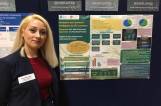
Ms. Maria Gourmou, BA student of the English Studies Dept., wins the “Best Dissemination of SURE Project International Faculty” Award
Congratulations to our student Maria Gourmou on winning the ‘Best Dissemination of SURE Project, International Faculty’ Award, at the Sheffield Undergraduate Research Experience (SURE) Project Showcase that took place at the University of Sheffield, UK, on February 16th. Her project is titled “Semantic and Syntactic Ambiguity by English Foreign Language Learners” and it was successfully presented in the SURE scheme Showcase. The SURE scheme is a funded research opportunity offered by the University of Sheffield to Level-2 students upon selection. Within the framework of SURE Ms. Maria Gourmou—currently a third-level student of the BA (Hons) in English Language and Linguistics—designed, conducted and delivered a 6-week research project under the guidance of her Supervisor, Dr. Paschalia Patsala, Head of the English Studies Department. Ms. Maria Gourmou at SURE Showcase “The SURE project was an amazing experience that offered me so much knowledge in my field of studies. I discovered my passion for research and identified the path that I want to follow after graduation. It is definitely a worthwhile experience and I urge all students to try it out!“ The Showcase welcomed a lot of students and displayed 120 projects with a variety of topics and innovative ideas. Every year the SURE Showcase is a celebration of all the hard work from the summer as it provides successful applicants with the opportunity to present their work, mingle and share ideas and opinions as well as exchange interesting conversations. The English Studies Department and the International Faculty, CITY College would like to express its heartfelt congratulations to Ms Maria Gourmou and wishes the best of luck to its Level 2 students who are applying for the SURE scheme project this year.
24/02/2017
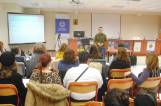
Dr Dimitriadis and Ms. Kosior invited as Guest Speakers to the “Teaching Techniques and Classroom Management for Diverse Pupils” Conference
Dr Giorgos Dimitriadis and Ms. Margarita Kosior from the English Studies Department participated as Guest Speakers in a one-day Conference on teaching techniques and classroom management skills for diverse pupils. The seminar aimed at familiarising teachers with class environments that include refugee and immigrant student population. The event was organised for English and Greek language teachers in public schools by the Regional Administration of Education of Central Macedonia in collaboration with Doctors of the World (Médecins du Monde) and was held on Saturday 28 January. Dr Dimitriadis and Ms. Kosior delivered a presentation titled "Film Meets ELT: Making the Best of the Multicultural Classroom," in which they elaborated on the effectiveness of using cinema as a tool for language teaching and also provided participants with ideas on how they can use movies in their teaching within the specific thematic context of the seminar.
10/02/2017
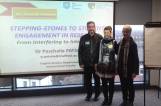
Dr Patsala Presenting at the 11th Annual Learning and Teaching Conference of the University of Sheffield
The University of Sheffield opened the New Year in a dynamic way with its 11th Annual Learning and Teaching Conference, held on Tuesday, January 10th, 2017. With the focus being on “Engaging Students in a Research-Intensive Environment,” the Conference explored the meaning of “engagement” in the context of The University of Sheffield environment where quality, dialogue, experimentation and inquiry are integral to inspiring students as well as leading to successful research. Among the speakers, who came from 30 different Departments of the University, the Head of our English Studies Department of CITY College, Dr. Paschalia Patsala delivered a presentation under the topic: “Stepping Stones to Student Engagement in Research: From Interfering to Interacting” which actually reflected her emphasis as a Lecturer on the significance of Project-based Learning, student engagement strategies, as well as the constant effort to cultivate a research culture within the Department’s MA and BA programmes. Dr Patsala, Prof. Kefalas and Prof. Simons The MA Unit ‘Corpus Linguistics’ served as a very representative example demonstrating the significance of both knowledge and skills, the need for actual application which by extension leads to and fosters investigation, inquiry and framing original research questions. Projects assigned are thus student-driven and highly realistic. Two MA and one BA student described through a video projection their overall experience illustrating how students literally had undertaken the role of a linguistics researcher and contributed within and outside the academic community with their participation in International Conferences. Moreover, Dr Patsala exhibited how student engagement with an eye towards research is sought out and achieved in the English Studies Dept., explaining how academic staff introduce and establish in the Postgraduate Programmes the concept of research, integrate it in the curriculum, assign assignments to that effect, expose students to respective seminars and workshops, as well as maintain a constructive dialogue enabling students to find their passion, pose their questions and feel the need to research their interests further. All in all, the Annual Learning and Teaching Conference of the University is a forum of critical thinking, which encourages the sharing of experiences and constructive dialogue among colleagues from various Schools and disciplines on various Teaching & Learning issues towards academic advancement. Dr Nigel Russell, Prof. Kefalas and Dr Patsala
19/01/2017
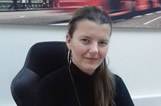
TESOL Macedonia Thrace hosts an Interview with Dr Paschalia Patsala in its December Bulletin Issue
“My interest in Linguistics was love at a first sight! And although some claim that this is often cured at a second look, the more I delved into this field of science, the more I knew it was meant to be like that…” Dr Paschalia Patsala Head of English Studies Department The special Christmas issue of the TESOL Macedonia Thrace e-Bulletin is out hosting an interview with Dr Paschalia Patsala, Head of our English Studies Department. The professional association of Teachers of English to Speakers of Other Languages (TESOL) Macedonia Thrace, which is also an associate member of the International Association of Teachers of English as a Foreign Language (IATEFL), was pleased to announce a wonderful opportunity offered to Dr Patsala to provide a concise account of her rich academic and professional background. Wonderful in the sense that educators are constantly projecting their gaze, concern and efforts onto others; having the spotlight projected back on them is both wonderful, but also rare. Being constantly focused on their students, colleagues, programmes, the institution and society, rarely do educators experience moments such as this, which allow them as individuals to share their insight, their internal-view. In her interview, Dr. Patsala clearly expresses her love for the discipline of Linguistics, for CITY College—her “natural habitat” as she claims, Higher Education and the multiple roles, duties, obligations and people she engages with on a day-to-day basis. While she admits to there being challenges and difficulties, she does not shy away from aiming to doing her absolute best so as to achieve all set-out goals and leave her ‘educational-carbon-footprint.’ Balance, passion, collaboration and dialogue with both students and colleagues are integral for both educational and managerial purposes. Ultimate conclusion? The need to constantly evolve, academically, professionally, and personally. While not all can be said in an interview, Dr. Patsala’s account is being communicated in such a way that leaves the audience expecting many more achievements and contributions to the world of academia.
19/12/2016
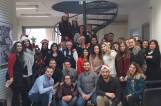
Our English Studies Department got us into the festive spirit with its Christmas Gathering!!
Literally 10 days before Christmas and the English Studies Department of the International Faculty called “all ye faithful” and “rocked around the Christmas tree” with its students and staff welcoming the most wonderful time of the year! Staff and students ensured that all provisions were made and that the gathering took place in a warm, cozy and toasty atmosphere. The trimming of the tree truly began to make the second floor of Proxenou Koromila building look a lot like Christmas. Students and staff remained faithful to their Santa-hat tradition whilst also adding reindeer-antler headbands to spice up the mood! Refreshments and beverages overflowed, and snow-flake/X-mas tree/Santa-shaped cookies, traditional pitas, and pastry delights were served amidst the two snowmen mascots and a miniature tree centerpiece. An “arts and crafts” corner ensured the full additional decoration of every window and mirror surface with student hand-made snowflakes. The musical ambience consisting of renowned carols ranged from “White Christmas” to “Feliz Navidad.” Secret-Santa gifts were offered to the winners of the lottery who received them with great excitement as a sign of good luck! A plethora of photos were taken thus capturing and reflecting the joy and cheer of all present! The gathering, as expected, did not resemble a “Silent Night” as laughter and conversation abound! While students and staff did not see a “White Christmas” in spite of wishes to “Let it Snow,” they did manage to create their own “Winter Wonderland” and wish all a Holly Jolly Christmas and a Happy New Year! The English Studies Department would like to extend its heartfelt and warmest wishes to the whole CITY College community, wishing all Happy Holidays, Merry Christmas, a Happy New Year, peace and joy!!!
16/12/2016
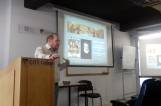
Prof. Adam Piette and Dr Gabriel Ozon, from the Sheffield School of English, visit the International Faculty
The English Studies Department of the International Faculty of the University of Sheffield, CITY College recently hosted Prof. Adam Piette, Head of the School of English, and Dr. Gabriel Ozon, Lecturer in the School of English. Their 3-day visit (November 7-9) was an excellent opportunity for staff members of the Faculty as well as students to engage in productive discussions, share insights and further establish and promote collaboration between the School of English and our English Studies Department (ESD). Prof. Petros Kefalas, Dr. Paschalia Patsala and members of the International Faculty and ESD staff met with Dr. Piette and Dr. Ozon on various occasions to discuss the progress of the newly-established Department, the good practices implemented, together with various challenges that have been successfully overcome, but also to work on future plans. Both Prof. Piette and Dr. Ozon gifted all interested participants with two interesting Seminars catering to literary, cultural and linguistic appetites, which proved highly engaging, informative and granted participants with additional insight to areas of culture and language. More precisely, Prof. Adam Piette’s presentation titled “The Homeric Parallel in the Coen Brothers’ O Brother Where Art Thou?” drew on M. Bakhtin’s theory of the chronotope to illustrate intertextual allusive relations between Homer’s Odyssey, the Coen Brothers’ film, as well as Michael Longley’s Homeric poems so as to establish political parallels–surprisingly relevant with the recent U.S presidential elections–and demonstrate affective, bodily, cultural and aesthetic categories. Dr. Gabriel Ozon’s presentation, on the other hand, under the title “Information Structure in a Spoken Corpus of Cameroon Pidgin English” raised awareness towards Cameroon Pidgin English as only a spoken language, the need to provide a written form, the corpus method of data collecting and hands-on experience with the research conducted in this area of Linguistics, thus enlightening all participants towards the benefits, difficulties and more importantly necessity of relevant research. In parting, yet another visit proved beneficial as it confirmed the mentality of dialogue, networking, feedback, collaboration and more importantly the sense of community-building both within and across Schools and Departments of the University of Sheffield.
04/12/2016
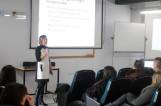
Dr Marina Mattheoudakis inaugurates the 2016-17 English Studies Department Open Seminars
It is with a dynamic, warm and thankful feeling that the English Studies Department initiated their first “ELT Methodology for All” series of Seminars for the 2016-2017 academic year. Students, staff members and visitors were fortunate to hear and learn about “The CLIL Method: From Europe to Greece” from Dr. Marina Mattheoudakis, Associate Professor of the Dept. of Theoretical and Applied Linguistics of the School of English, Aristotle University of Thessaloniki. Participants, who were able to attend the event either on the College premises or via live-streaming, were introduced to the CLIL Method (Content and Language Integrated Teaching). CLIL is an educational approach, inspired by the Canadian Immersion model of education, proposed and eventually adopted by Member States in Europe seeking to improve the European educational policy in general. Highly versatile and flexible, CLIL shifts away from traditional methods of teaching foreign languages, and poses as a significant alternative to stagnant teaching/learning methods. In light of the 8 key competences for Lifelong Learning of the European Framework, CLIL caters to the 4 Cs (Content; Cognition; Communication; Culture) every European must have in order to be a valuable, well-rounded individual and citizen of the world. As Dr. Mattheoudakis emphasised, recent research has demonstrated the multiple benefits which accompany the implementation of the CLIL method: the development of bilingualism within school education; the development of children’s cognitive skills; and the use and awareness of academic language early on. The CLIL method was first implemented in Greece in 2010 and more specifically in Thessaloniki in the 3rd Primary School of Evosmos–Experimental School. Under the direction and supervision of Dr. Marina Mattheoudakis, Dr. Thomai Alexiou and Ms Chryssa Laskaridou and with the collaboration and support of state school teachers and advisory directors, the Municipality of Thessaloniki, and the Ministry of Education, the CLIL method has lead to impressive results over the past six years. School subjects, such as History/Mythology, Physics, Arts, and Physical Education were taught exclusively in English and the use of CLIL led to student engagement, stimulation, active and autonomous learning but also full immersion. During the presentation, sample videos posed as testimony to all the informative and impressive aspects Dr. Mattheoudakis so readily, clearly and enthusiastically presented about the CLIL method. It goes without saying that the CLIL method provides a solution to a language-centered versus subject-centered teaching dilemma. Due to its high potential, it can be viewed as an ideal method for teaching English, foreign languages and all matters of other subjects, enhance student skills, as well as equip educators and learners with the necessary tools to foster and enhance life-long learning and a love towards education.
20/11/2016
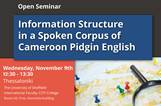
Open Seminar: Information Structure in a Spoken Corpus of Cameroon Pidgin English
Wednesday, 9 November 2016 FREE ENTRANCE Information: T: +30 2310 224421 E: a.kasiara@citycollege.sheffield.eu
08/11/2016
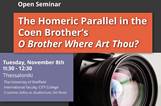
Open Seminar: The Homeric Parallel in the Coen Brothers' O Brother Where Art Thou?
Tuesday, 8 November 2016 FREE ENTRANCE Information: T: +30 2310 224421 E: a.kasiara@citycollege.sheffield.eu
07/11/2016
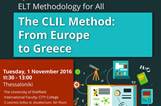
ELT Methodology Seminar: 'The CLIL Method: From Europe to Greece'
Tuesday, 1 November 2016 FREE ENTRANCE Seminar Overview (PDF) Online Participation Form Join and share! Information: T: +30 2310 224421 E: mkosior@citycollege.sheffield.eu
25/10/2016
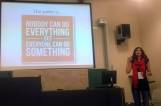
Ms Margarita Kosior from the English Studies Department on the stage of the 26th IATEFL-Hungary Annual Conference
On October 8th, Ms. Margarita Kosior, English Studies Department Lecturer, delivered her talk "Social Issues in ELT: From Social Context to Teaching Content" to the audience of the 26th IATEFL-Hungary Annual Conference "Dimensions, Diversity and Directions in ELT" in Kaposvár, Hungary. Ms. Kosior presented the ways in which she incorporates issues of global importance into her teaching conducted in the University of Sheffield International Faculty. As the number and the severity of problems we are facing is growing, Global Education is gaining popularity among English teachers. It is no longer a question of whether we should incorporate social issues into ELT, but rather how it can be done. In order to address this need, Ms Kosior presented a number of activities and tasks she employs in her teaching, but focused mainly on participating in well-structured projects and on various forms of collaboration with other educators and professionals involved in Global Education. Not every teacher is immediately willing to jump on the bandwagon, since discussion on social issues in an English language class will often result in heated debates, but also, if not conducted properly, in uncomfortable situations. Indeed, many social issues can be considered controversial or sensitive, therefore Ms. Kosior recommended "Toolkit for Learning and Teaching: Teaching Sensitivity and Controversial Topics" published on the University of Sheffield website which identifies the delicate topics, explains what the responsibility of the educator is and provides specific advice on how to manage a difficult discussion in class. Ms Kosior finished her presentation with an important message: we should not underestimate the value of our efforts, just because they may seem like a drop in the ocean. Every educator's and every student's voice can be heard and should be heard, and every effort can contribute to the greater good, ranging way beyond linguistic competence.
21/10/2016
  9 from 13 9 from 13   |
